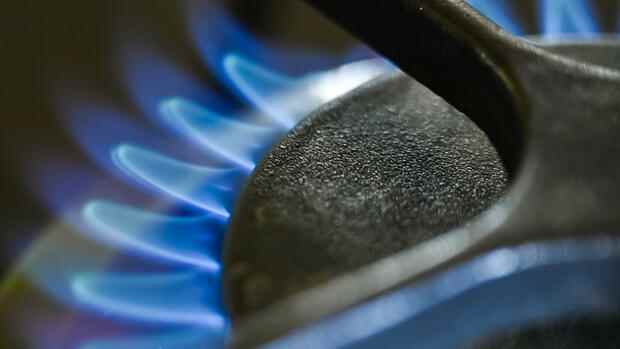For a household of four, there could be additional costs of up to 1000 euros.
(Photo: dpa)
Berlin The government’s plan for a gas levy to prop up struggling utilities is stalling. The levy planned for all gas customers from October cannot be levied as currently thought. The Handelsblatt learned this on Wednesday from coalition circles.
The legal situation according to the current Energy Security Act (Ensig) only allows such a surcharge for customers with fixed-price contracts if it is levied directly by the state. However, the planned surcharge is to be handled by the gas suppliers. The Reuters news agency first reported.
Specifically, it is about gas supply contracts with prices fixed over several years or special clauses on state levies. According to Reuters, this affects an estimated quarter of all gas contracts in Germany.
The Federal Ministry of Economics is now working on a legal amendment that could be decided in September after the end of the parliamentary summer break. The plan is still for the levy to take effect from October, according to those involved.
Top jobs of the day
Find the best jobs now and
be notified by email.
In industry circles, it is made clear that the levy will not fail because of this. However, the necessary adjustment could influence the timing, says the governing coalition. The reason for this is that the gas suppliers are obliged to inform their customers six weeks in advance.
>> Read here: “It’s here and can be delivered”: Chancellor Scholz counters Putin’s turbine bluff
It was therefore planned to set the amount of the levy on August 15, it should be between 1.5 and five cents per kilowatt hour. But with the legal adjustment in September, the determination will probably not be made then. It is possible that this will only be roughly staked out at first.
Gas prices have risen sharply recently.
(Photo: AP)
The levy is intended to benefit importers like Uniper, who have to buy failed deliveries from Russia at short notice and at great expense on the market. Due to existing contracts with customers, however, they are not yet allowed to pass on the increased prices.
The levy should allow importers to pass on 90 percent of the extra costs to all customers, with the same amount per kilowatt hour for everyone – regardless of where they signed their contract.
For a household of four, this could mean additional costs of up to 1000 euros, in addition to the price increases that are already possible in the contract with certain deadlines. The government therefore wants to put together a relief package for poorer households – for example through a housing benefit reform.
Government is pressed for time
The aim of the surcharge is primarily to stabilize the importers and then also the suppliers, as also stated in the draft of the levy ordinance, which is available to the Handelsblatt: “It is necessary to relieve the gas importers of the sole financial burden of procuring replacements to prevent their insolvency and thus their failure in the gas supply chain.”
The regulation, which regulates the details, is to be passed by the government despite the legal problems and could then come into force on a new basis from September.
The ordinance also stipulates that the surcharge for industry and households is adjusted every three months – depending on how high the replacement procurement costs of the importers are. In addition, according to the draft, the government has identified a gas shortage for the first time, which is a prerequisite for the surcharge.
Until then, however, it must also be clarified whether value-added tax will be charged on the gas surcharge. The federal government wants to prevent that, according to informed circles. However, it is still unclear whether this is legally possible. If not, the revenue will be used to finance relief for the population, it said.
From November, customers are also threatened with a second gas tax under the Gas Storage Act. According to industry circles, the suppliers initially wanted to do without it because of the small amounts. A possible surcharge would have been less than 0.5 cents, which would not have justified the bureaucratic effort. However, the recently tightened gas storage law provides for higher fill level specifications, which means that more gas has to be bought as a result.
With material from Reuters
More: This is how expensive the new gas surcharge will be for consumers

